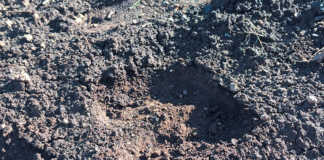
Photo: Bill Kerr
Although you can already get good production in the first year of starting vegetable production, the process is ongoing. By following the steps described below, you can fast-track with some extra effort in the beginning.
You will have to do some tillage in the first year, and if you don’t already own a tractor, you can hire someone to do this initial work. Thereafter no further tractor work will be essential.
READ Starting a no-frills vegetable project on a small farm
It is very important to have a soil analysis done in order to determine what is already in your soil and what needs to be applied and incorporated.
Phosphorous moves very slowly down the soil profile and thus needs to be incorporated while this opportunity is available.
The same applies to lime, and if the soil is acid, the lime will slow down the action of phosphorous being combined with other minerals into an available form that can be taken up by the plants.
Without a soil analysis you’ll be working blind and perhaps waste fertiliser or have lower yields on account of soil deficiencies and imbalances.
Add organic matter
In the first year, also use the opportunity to add organic matter in the form of manure or compost, which will be essential for the development of beneficial soil organisms that contribute to plant health, productivity and the conversion of soil minerals into an available state for the plants to use.
You need to apply a large amount of manure for the fast-tracking of the soil into a highly productive state. Apply 60t or more of cattle manure per hectare, and 10t of poultry manure if available. If you can’t afford this to start off with, rather prepare only as much soil as you can afford and do the rest later.
READ Using manure as fertiliser: Mistakes to avoid
The manure can be mechanically worked in to a depth of 20cm. The contractor can then bring in a bed former. Pay attention to get the beds straight at this time as these beds will not be made ever again.
This may be the end of all tractor work, unless you have a tractor and sprayer, or perhaps a bed former to occasionally go over the beds to bring up any soil that has washed into the pathways.
In my case, I try to maintain the shape when hoeing weeds as my property has not seen a tractor for over 20 years.
By following the above recipe, you would be able to get good yields right from the start. If you decide to go the organic route, the applied fertiliser will perhaps be the last, but you will probably need to apply some LAN before dispensing with fertiliser altogether.
It will take a few years to get the soil into a highly productive and economical state, and you can consider the expenses as putting money into an investment that will pay handsome dividends later.
All of us who have gone through this experience have derived so much pleasure and satisfaction in watching the transformation of our soils and crops.
As I have been through this process I can vouch for the benefits that will follow.












